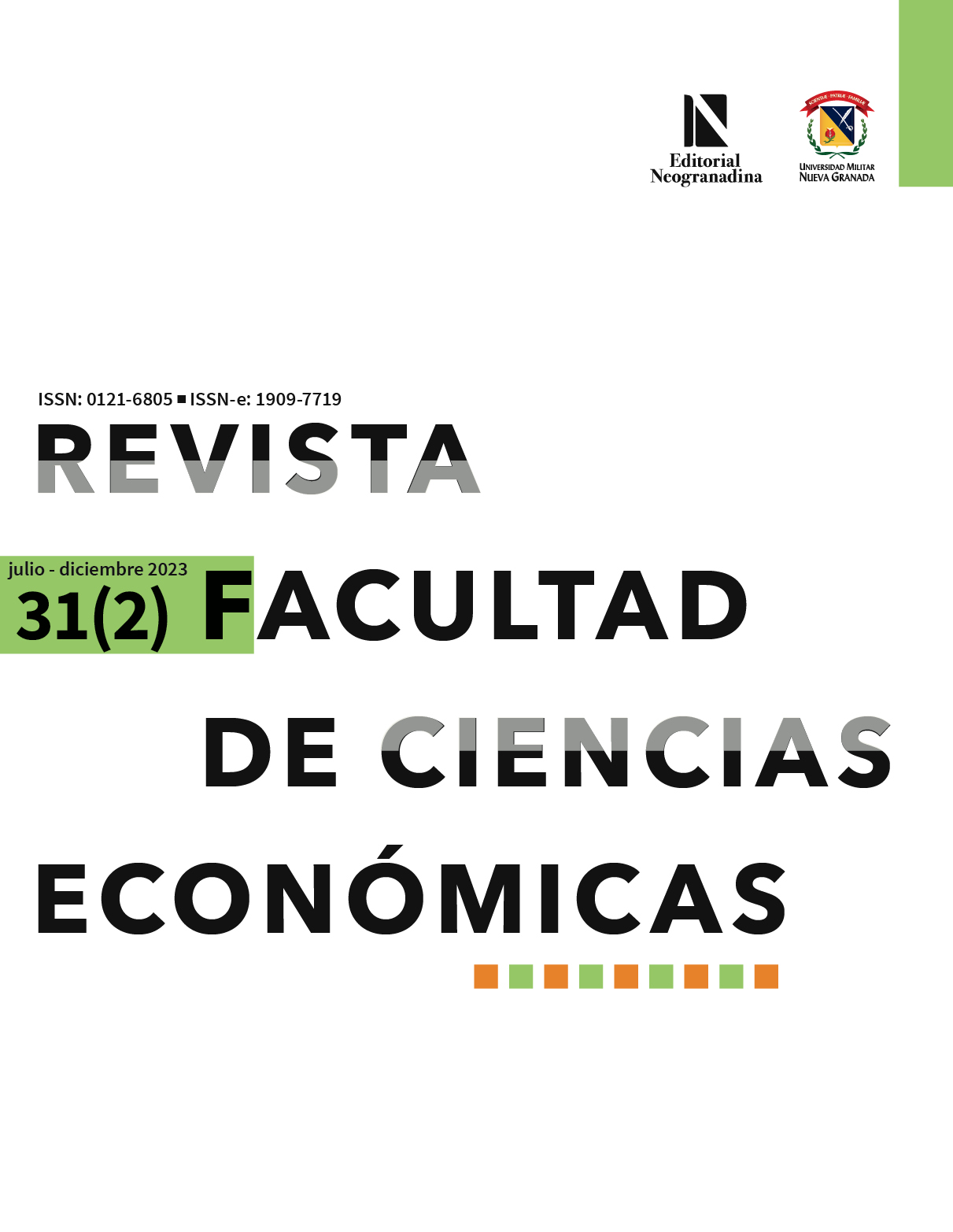Challenges of Sustainable Energy Transition
Perspectives for Research and Management
Abstract
The concept of energy transition is present on the global political agenda as an indispensable process for the sustainable development of countries. In this context, the article documents the development of research in the domain of sustainable energy transition as a cornerstone of the global geopolitical agenda and reflects on the challenges posed by this phenomenon from the research, geopolitical, and geoeconomic perspectives. The methodology used involves literature review combined with bibliometric analysis and content analysis techniques of research documents retrieved from the Web of Science and sector-specific databases. The most significant findings indicate the following: first, the Paris Agreement has driven research related to sustainable development, transition, and energy security across technical, cultural, social, political, and economic domains; second, at the geopolitical level, the energy transition process plays a decisive role in the global political chessboard, where countries assess their strengths in terms of the continuity of energy supply for their citizens; and third, at the geoeconomic level, coal and oil-exporting countries adjust public spending to functional budgets within the framework of renewable energies. The authors conclude that a gradual transition and balancing of the energy matrix are essential to reduce greenhouse gases causing global warming and ensure energy sustainability without drastically impacting nations' economies.
Downloads
References
ANH. (2022). Datos y estadísticas: producción diaria de petróleo. Agencia Nacional de Hidrocarburos. https://www.anh.gov.co/es/operaciones-y-regalías/datos-y-estadisticas/
Asif, M. y Muneer, T. (2007). Energy supply, its demand and security issues for developed and emerging economies. Renewable and Sustainable Energy Reviews, 11(7), 1388-1413.https://doi.org/10.1016/J.RSER.2005.12.004
Banco Mundial. (2020). Energía. Panorama General. https://www.bancomundial.org/es/topic/energy/overview#1
BBC. (2022). Rusia invade Ucrania: cómo fue el inicio de la operación militar ordenada por Putin. British Broadcasting Corporation.https://www.bbc.com/mundo/noticias-internacional-60514738
Bejerano, J. B. y Jové-Llopis, E. (2019). Mercados eléctricos ante la transición energética: diseño y retos de futuro. Presupuesto y Gasto Público, 97, 177-192.
Bresser, D., Buchholz, D., Moretti, A., Varzi, A. y Passerini, S. (2018). Alternative binders for sustainable electrochemical energy storage - the transition to aqueous electrode processing and bio-derived polymers. Energy & Environmental Science, 11(11), 3096-3127.https://doi.org/10.1039/C8EE00640G
British Petroleum. (2021). Statistical Review of World Energy. BP Energy Outlook 2021, 70, 1-72. https://www.bp.com/content/dam/bp/business-sites/en/global/corporate/pdfs/energy-economics/statistical-review/bp-stats-review-2021-full-report.pdf
Brundtland, G. H. (1987). Our Common Future-Call for Action. Environmental Conservation, 14(4), 291-294. https://doi.org/10.1017/S0376892900016805
Bustamante, P., García, R., Maya, O., Rodriguez, J. F. y Aguilar, T. (2021). Minería de carbón en colombia. Asociación Colombiana de Minería, 1-49. https://www.minenergia.gov.co/documents/10192/24311177/Presentacion-Carbon.pdf
CEPAL. (2022). Anuario Estadístico de América Latina y el Caribe 2021. Comisión Económica Para América Latina y El Caribe. (LC/PUB.2021/20-P), Santiago, 1-161.
Chadegani, A. A., Salehi, H., Yunus, M. M., Farhadi, H., Fooladi, M., Farhadi, M. y Ebrahim, N. A. (2013). A ComParíson between Two Main Academic Literature Collections: Web of Science and Scopus Databases. Asian Social Science, 9(5), p18.https://doi.org/10.5539/ASS.V9N5P18
Child, M., Koskinen, O., Linnanen, L. y Breyer, C. (2018). Sustainability guardrails for energy scenarios of the global energy transition. Renewable and Sustainable Energy Reviews, 91, 321-334. https://doi.org/10.1016/J.RSER.2018.03.079
Choudhary, K. y Sangwan, K. S. (2022). Green supply chain management pressures, practices and performance: a critical literature review. Benchmarking: An International Journal, 29(5), 1393-1428.https://doi.org/10.1108/BIJ-05-2021-0242
DANE. (2022). PIB a precios corrientes 2021. Departamento Administrativo Nacional de Estadística.
Diesen, G. y Lukin, A. (2020). Russia in a Changing World. Palgrave Macmillan.https://doi.org/10.1007/978-981-15-1895-9
DNP. (2022). Aprobado CONPES de Transición Energética que consolidará el proceso hacia un desarrollo y crecimiento económico sostenible. Dirección Nacional de Planeación.
Dominković, D. F., Bačeković, I., Pedersen, A. S. y Krajačić, G. (2018). The future of transportation in sustainable energy systems: Opportunities and barriers in a clean energy transition. Renewable and Sustainable Energy Reviews, 82, 1823-1838.https://doi.org/10.1016/J.RSER.2017.06.117
El Baz, J. y Iddik, S. (2020). Green supply chain management and organizational culture: a bibliometric analysis based on Scopus data (2001-2020). International Journal of Organizational Analysis, 30(1), 156-179. https://doi.org/10.1108/IJOA-07-2020-2307
Elkington, J. y Rowlands, I. H. (1999). Cannibals with forks: The triple bottom line of 21st century business. Alternatives Journal, 25(4).https://doi.org/10.1002/tqem.3310080106
Expansión. (2022). Colombia: generación de electricidad. Datos Macro - Expansión.Com.
Giménez, P. (2017). La Agenda 2030 de Desarrollo Sostenible : especial referencia al Objetivo 7 en la Unión Europea. Universidad Internacional de La Rioja, 1-43.
Henckens, M. L. C. M. (2022). The Energy Transition and Energy Equity: A Compatible Combination? Sustainability 2022, Vol. 14, Page 4781, 14(8), 4781.https://doi.org/10.3390/SU14084781
Hess, D. J. (2018). Energy democracy and social movements: A multi-coalition perspective on the politics of sustainability transitions. Energy Research & Social Science, 40, 177-189.https://doi.org/10.1016/J.ERSS.2018.01.003
IEA. (2021a). Net Zero by 2050 - A Roadmap for the Global Energy Sector. https://www.iea.org/t&c/
IEA. (2021b). World Energy Outlook 2021. International Energy Agency. https://www.iea.org/weo
Jabareen, Y. (2006). A New Conceptual Framework for Sustainable Development. Environment, Development and Sustainability 2006 10:2, 10(2), 179-192. https://doi.org/10.1007/S10668-006-9058-Z
Jacobus, A. (2006). Sustainable development - historical roots of the concept. Environmental Sciences, 36(2), 83-96. https://doi.org/10.1080/15693430600688831
Kaufmann, R. K. y Ullman, B. (2009). Oil prices, speculation, and fundamentals: Interpreting causal relations among spot and futures prices. Energy Economics, 31(4), 550-558.https://doi.org/10.1016/j.eneco.2009.01.013
Kern, F. y Smith, A. (2008). Restructuring energy systems for sustainability? Energy transition policy in the Netherlands. Energy Policy, 36(11), 4093-4103.https://doi.org/10.1016/J.ENPOL.2008.06.018
Kucherov, F. A., Romashov, L. V., Galkin, K. I. y Ananikov, V. P. (2018). Chemical Transformations of Biomass-Derived C6-Furanic Platform Chemicals for Sustainable Energy Research, Materials Science, and Synthetic Building Blocks. ACS Sustainable Chemistry and Engineering, 6(7), 8064-8092.https://doi.org/10.1021/acssuschemeng.8b00971
Kuzemko, C., Bradshaw, M., Bridge, G., Goldthau, A., Jewell, J., Overland, I., Scholten, D., Van de Graaf, T. y Westphal, K. (2020). Covid-19 and the politics of sustainable energy transitions. Energy Research & Social Science, 68, 101685.https://doi.org/10.1016/J.ERSS.2020.101685
Lockwood, M., Kuzemko, C., Mitchell, C. y Hoggett, R. (2016). Historical institutionalism and the politics of sustainable energy transitions: A research agenda:https://doi.org/10.1177/0263774X16660561
López-Robles, J., Guallar, J., Otegi-Olaso, J., Gamboa-Rosales, N. (2019). El profesional de la información (EPI): Bibliometric and thematic analysis (2006-2017). El Profesional de La Información, 28(4). https://doi.org/10.3145/epi.2019.jul.17
Maditati, D. R., Munim, Z. H., Schramm, H. y Kummer, S. (2018). A review of green supply chain management: From bibliometric analysis to a conceptual framework and future research directions. Resources, Conservation and Recycling, 139, 150-162. https://doi.org/10.1016/j.resconrec.2018.08.004
Makarov, A. A., Mitrova, T. A. y Kulagin, V. A. (2019). Global and Russian Energy Outlook 2019. The Energy Research Institute of the Russian Academy of Sciences The Energy Centre, Moscow School of Management SKOLKOVO, 1-211.
Martinez, A., Delgado, M., Cruz, N., Gallego, A. y Hernandez, D. (2021). Los retos del Grupo ecopetrol y del país frente a la transición energética. Fedesarrollo, 1-55.
Mensah, J. (2019). Sustainable development: Meaning, history, principles, pillars, and implications for human action: Literature review. Cogent Social Sciences, 5(1).https://doi.org/10.1080/23311886.2019.1653531
Merli, R., Preziosi, M. y Acampora, A. (2018). How do scholars approach the circular economy? A systematic literature review. Journal of Cleaner Production, 178, 703-722. https://doi.org/10.1016/j.jclepro.2017.12.112
Ministerio de Minas y Energía. (2021). Transición Energética: Un legado para el presente y el futuro de Colombia' (La imprenta Editores). https://www.conte.org.co/libro-transicion-energetica-un-legado-para-el-presente-y-el-futuro-de-colombia/
Neacșa, A., Panait, M., Mureșan, J. D., Voica, M. C. y Manta, O. (2022). The Energy Transition between Desideratum and Challenge: Are Cogeneration and Trigeneration the Best Solution? International Journal of Environmental Research and Public Health 2022, Vol. 19, Page 3039, 19(5), 3039.https://doi.org/10.3390/IJERPH19053039
OMS. (2020). Declaración sobre la segunda reunión del Comité de Emergencias del Reglamento Sanitario Internacional (2005) acerca del brote del nuevo coronavirus (2019-nCoV). Organización Mundial de La Salud. https://www.who.int/es/news/item/30-01-2020-statement-on-the-second-meeting-of-the-international-health-regulations-(2005)-emergency-committee-regarding-the-outbreak-of-novel-coronavirus-(2019-ncov)
Overland, I., Bazilian, M., Ilimbek Uulu, T., Vakulchuk, R. y Westphal, K. (2019). The GeGaLo index: Geopolitical gains and losses after energy transition. Energy Strategy Reviews, 26, 1-16.https://doi.org/10.1016/j.esr.2019.100406
Porfiriev, B. N. (2016). Tendencias "verdes" en el sistema financiero mundial. Economía Mundial y Relaciones Internacionales, 60(9), 5-16.
Saidi, K. y Omri, A. (2020). The impact of renewable energy on carbon emissions and economic growth in 15 major renewable energy-consuming countries. Environmental Research, 186, 109567. https://doi.org/10.1016/J.ENVRES.2020.109567
Seyfang, G. y Haxeltine, A. (2012). Growing Grassroots Innovations: Exploring the Role of Community-Based Initiatives in Governing Sustainable Energy Transitions. Environment and Planning C: Government and Policy, 30(3), 381-400.https://doi.org/10.1068/C10222
Steg, L., Perlaviciute, G. y van der Werff, E. (2015). Understanding the human dimensions of a sustainable energy transition. Frontiers in Psychology, 6, 805.https://doi.org/10.3389/FPSYG.2015.00805/BIBTEX
Stern, D. I. (2018). Energy-GDP Relationship BT - The New Palgrave Dictionary of Economics. Macmillan Publishers Ltd, 3697-3714.https://doi.org/10.1057/978-1-349-95189-5_3015
Suarez, M. F., Ramirez, R. H., Martinez, J., Leyva, S., Viana, R. y Sandoval, W. (2019). Guía para la incorporación de la dimensión minero energética en los planes de ordenamiento departamental. Unidad de Planeación Minero Energética - UPME, 1-141.
The Economist. (2020). The end of the Arab world's oil age is nigh. The Economist. https://www.economist.com/middle-east-and-africa/2020/07/18/the-end-of-the-arab-worlds-oil-age-is-nigh
UNFCCC. (2015). The París Agreement. United Nations Climate Change, 1-29. https://doi.org/10.16925/co.v25i111.1874
United Nations. (2015). The París Agreement. Framework Convention on Climate Change (UNFCCC) UNFCCC. https://www.unaoc.org/images/mou_iom.pdf
UPME. (2019). Plan Energetico Nacional 2020-2050. Unidad de Planeación Minero Energética - UPME, 1-86. https://www1.upme.gov.co/
Vilisov, M. (2020). La transición energética y su impacto en la política estatal. Universidad Estatal M. V. Lomonósov de Moscú, Rusia, 1-16.
Wilson, C. y Grubler, A. (2011). Lessons from the history of technological change for clean energy scenarios and policies. Natural Resources Forum, 35(3), 165-184.https://doi.org/10.1111/J.1477-8947.2011.01386.X
World Bank. (2021). Gross domestic product 2020. World Development Indicators Database, 1-4. https://doi.org/10.1787/54ace363-en
World Economic Forum. (2022). Fostering Effective Energy Transition 2022. https://www.weforum.org/reports/fostering-effective-energy-transition-2022/
Copyright (c) 2023 Revista Facultad de Ciencias Económicas

This work is licensed under a Creative Commons Attribution-NonCommercial-NoDerivatives 4.0 International License.











